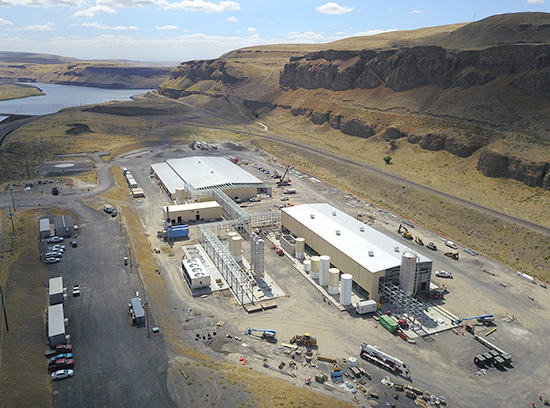|
Subscribe / Renew |
|
|
Contact Us |
|
| ► Subscribe to our Free Weekly Newsletter | |
| home | Welcome, sign in or click here to subscribe. | login |
Construction
| |
 |
January 22, 2019
Best in state: Gold award
Future value to engineering profession
Landau Associates

Project: Columbia Pulp mill
Client: Columbia Pulp
A new pilot plant and pulp mill in Columbia County introduces an entirely new, proprietary, low-chemical pulping process.
The mill, owned by Columbia Pulp, takes waste straw and generates a tree-free replacement for traditional paper and packaging products. The process uses less energy and water and produces fewer air emissions than wood pulp mills.
As the consultant team lead for environmental engineering and permitting, Landau Associates was able to enhance the facility’s sustainable operations, shrink its environmental footprint and reduce operational costs.
The 449-acre project site is located on the south bank of the Snake River along state Route 261, two miles upstream from Lyons Ferry, in the heart of one of the densest wheat farming regions in North America. The plant introduces many components, including a pulp processing building, a carbohydrate concentration building, a pulp storage warehouse, a process/firewater tank, several ancillary structures and two new substations.
Landau was challenged with securing environmental permits for a facility with no industrial-scale precedent — a job that required careful characterization of the facility’s processes and collaboration with regulatory agencies to ensure the facility’s engineering controls would meet regulatory requirements.
The most common wastewater treatment methods in the pulp and paper industry are aerated ponds and activated sludge systems, which produce effluent wastewater containing pollutants. Landau introduced a process engineering design change that incorporated the use of a multiple-effect evaporation process that allowed the plant to be a zero-liquid-discharge facility with no pollutant loading to local surface water bodies.
In addition to eliminating the discharge of 600,000 gallons per day of wastewater, the design change allowed reduced use of fresh water and expedited facility permitting by avoiding the need for National Pollutant Discharge Elimination System wastewater discharge permitting.
To prove to the state Department of Ecology that the new mill would produce far fewer emissions than its pulp mill counterpart, Landau partnered with Columbia Pulp to complete an evaluation to estimate emissions from the facility, document air quality impacts to the surrounding community, and ensure the facility was designed to meet Ecology’s best available control technology requirements.
The evaluation, which was approved by Ecology, demonstrated that Columbia Pulp’s new manufacturing process will have the potential to emit 99 percent fewer criteria air pollutants than other traditional pulp and paper facilities.
Other Stories:
- National finalist: Platinum award
Structural systems
Magnusson Klemencic Associates - Best in state: Gold award
Complexity
Reid Middleton - Best in state: Gold award
Unique or innovative applications
Stantec Consulting Services - Best in state: Gold award
Successful fulfillment of client/owner needs
Golder Associates - Best in state: Gold award
Successful fulfillment of client/owner needs
Cary Kopczynski & Co. - National finalist: Gold award
Transportation
WSP - National finalist: Gold award
Structural systems
HDR/Shannon & Wilson - National finalist: Gold award
Special projects
David Evans and Associates - National finalist: Gold award
Structural systems
BergerABAM - Engineer of the Year


